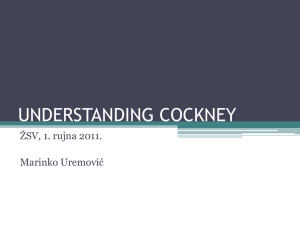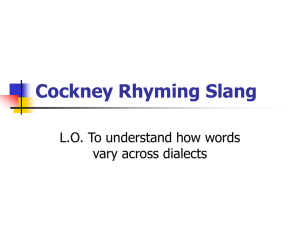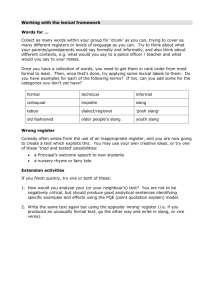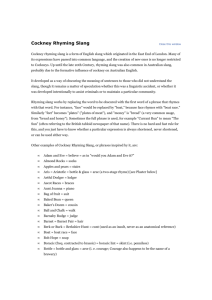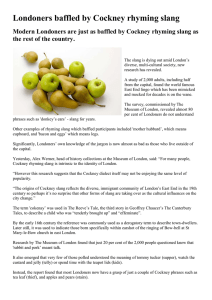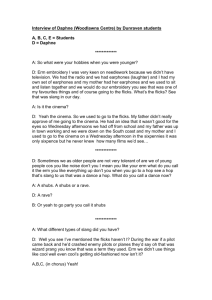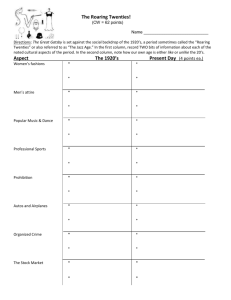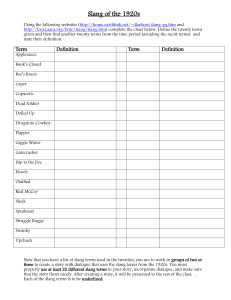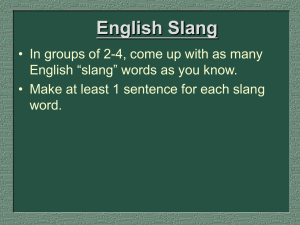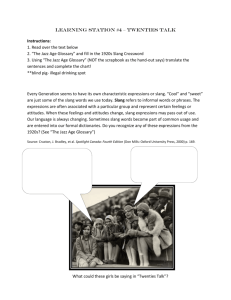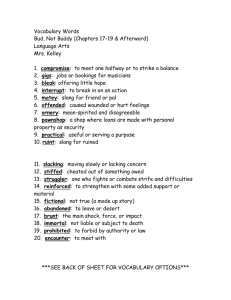placement test
advertisement
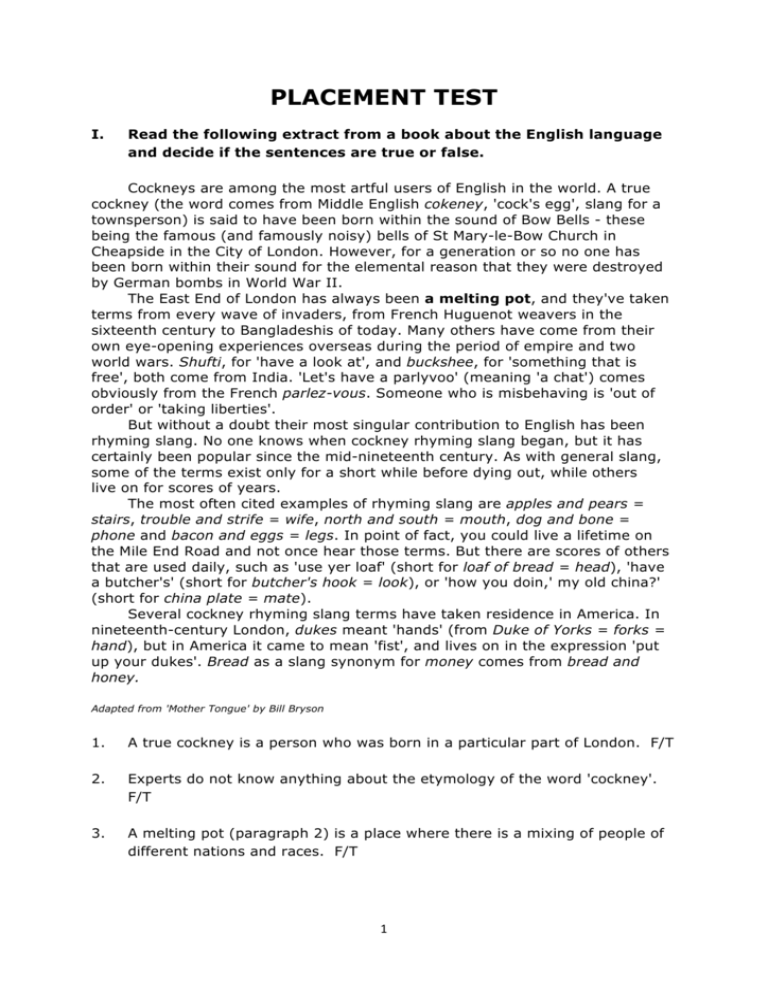
PLACEMENT TEST I. Read the following extract from a book about the English language and decide if the sentences are true or false. Cockneys are among the most artful users of English in the world. A true cockney (the word comes from Middle English cokeney, 'cock's egg', slang for a townsperson) is said to have been born within the sound of Bow Bells - these being the famous (and famously noisy) bells of St Mary-le-Bow Church in Cheapside in the City of London. However, for a generation or so no one has been born within their sound for the elemental reason that they were destroyed by German bombs in World War II. The East End of London has always been a melting pot, and they've taken terms from every wave of invaders, from French Huguenot weavers in the sixteenth century to Bangladeshis of today. Many others have come from their own eye-opening experiences overseas during the period of empire and two world wars. Shufti, for 'have a look at', and buckshee, for 'something that is free', both come from India. 'Let's have a parlyvoo' (meaning 'a chat') comes obviously from the French parlez-vous. Someone who is misbehaving is 'out of order' or 'taking liberties'. But without a doubt their most singular contribution to English has been rhyming slang. No one knows when cockney rhyming slang began, but it has certainly been popular since the mid-nineteenth century. As with general slang, some of the terms exist only for a short while before dying out, while others live on for scores of years. The most often cited examples of rhyming slang are apples and pears = stairs, trouble and strife = wife, north and south = mouth, dog and bone = phone and bacon and eggs = legs. In point of fact, you could live a lifetime on the Mile End Road and not once hear those terms. But there are scores of others that are used daily, such as 'use yer loaf' (short for loaf of bread = head), 'have a butcher's' (short for butcher's hook = look), or 'how you doin,' my old china?' (short for china plate = mate). Several cockney rhyming slang terms have taken residence in America. In nineteenth-century London, dukes meant 'hands' (from Duke of Yorks = forks = hand), but in America it came to mean 'fist', and lives on in the expression 'put up your dukes'. Bread as a slang synonym for money comes from bread and honey. Adapted from 'Mother Tongue' by Bill Bryson 1. A true cockney is a person who was born in a particular part of London. F/T 2. Experts do not know anything about the etymology of the word 'cockney'. F/T 3. A melting pot (paragraph 2) is a place where there is a mixing of people of different nations and races. F/T 1 4. According to the author, slang expressions always become obsolete after a short time. F/T 5. In cockney rhyming slang, the rhyming word is hardly ever dropped in use. F/T 6. Some cockney rhyming slang expressions are frequently used in American English. F/T II. Choose the correct answer a, b, c or d. 1. Sea levels are expected to _____ considerably in the future. a) lift b) raise c) rise d) arise 2. She was very tired so she just _____ on the bed and went to sleep. a) lied b) lay c) laid d) lain 3. She was sentenced _____ 10 years in prison last year. a) with b) to c) for d) in 4. A lot of animals face the threat of _____ . a) extinguish b) hunting c) destruction d) extinction 5. We would like to congratulate you _____ passing all your exams. a) on b) with c) for d) of 6. These jeans don't _____ me any more; they're too tight round the waist. a) suit b) fit c) match d) go with 7. The match was postponed due to the _____ rain. a) strong b) hard c) forceful d) heavy 8. She only needs to put a _____ of salt in the mixture, not a whole teaspoonful. a) piece b) drop c) little d) pinch 2 9. He is an optimistic person with a positive _____ on life. a) position b) outlook c) point of view d) attitude 10. Which do you find more _____ , travelling by train or by bus? a) tiring b) tired c) tiredness d) tirelessly 11. He is said to be a great artist but I consider his work to be quite _____ . a) medium b) moderate c) intermediate d) mediocre 12. The train was _____ by a heavy snowfall. a) postponed b) cancelled c) delayed d) adjourned 13. He has an overdraft at the bank. He is in the _____ . a) red b) pink c) yellow d) black 14. One of the _____ of this job is that I get free insurance. a) salaries b) bonuses c) wages d) perks III. Decide which answer (a, b, c or d) best fits each gap. 1. 2. 3. You __________, and it’s getting on my nerves. a) always are contradicting me c) contradicted me always b) contradict me always d) are always contradicting me If you go to Japan, you’ll have to __________ with chopsticks. a) be used to eat c) get used to eat b) be used to eating d) get used to eating If you're feeling tired, you __________ to bed. a) better went c) better had to go b) had better go d) had to better go 3 4. 5. The room is in a terrible mess. It __________ cleaned. a) mustn’t be c) can’t be b) mustn’t have been d) can’t have been I __________ to get through for the last half hour but the line’s been engaged. 6. 7. 8. 9. a) have been trying c) had been trying b) tried d) was trying This time tomorrow we __________ over the Pacific Ocean. a) will be flying c) fly b) will fly d) are flying Unless you __________ them the truth, they’ll keep blackmailing you. a) tell c) will tell b) won’t tell d) don’t tell __________ anyone ring, ask them to leave a message. a) Would c) Might b) Should d) Supposing __________ find a dead body in the bath, you’d find it difficult to believe. a) Were you c) Were you to b) You were to d) If were you to 10. If it wasn't for the fact that he was an up–and–coming politician, she __________ him. a) would never have married c) might never marry b) would never marry d) will never marry 11. They wish they __________ divorced. a) never got c) had never got b) have never got d) would never have got 4 12. __________ having no previous experience, the applicant got the job. a) In spite c) Despite b) In spite of the fact d) Despite the fact that 13. __________ no coffee left, they had to make do with tea. a) It being c) It was b) There being d) There was 14. Only after they’d had a few additional classes __________ to understand the problem. a) they had started c) they started b) had they started d) did they start 15. The new smartphone, __________ low cost will make it attractive to everybody, is already on sale. a) which c) whose b) that d) where 16. There is considered __________ no risk involved in the enterprise. a) to have been c) to having been b) that it is d) that it was 17. After University, I went on __________ a teacher. a) to become c) by becoming b) becoming d) having become 18. If I spoke quickly, you’d have difficulty __________ . a) to understand c) with understanding b) in understanding d) with the understanding IV. Change the word in italics to fit into the sentence. There is an example at the beginning. 0. It’s difficult to make a ___ choice ___. 5 choose 1. The __________ of the talks was regrettable. fail 2. There’s no __________ between the two. compare 3. The proposal was rejected because it was __________. practice 4. The student spoke with such a strong accent that what he said was __________ . comprehend 5. The Coronation was a __________ occasion. moment 6. They threw themselves __________ into the new project. enthusiasm 7. It has been proved __________ that smoking can seriously affect your health. conclude V. Complete the following sentences using the appropriate prepositions. There is an example at the beginning. 0. We’re really looking ___forward___ ___to___ seeing you again. 1. I’m not prepared to put ______ ______ your inefficiency any longer. You’re fired! 2. After the scandal, he was looked ______ ______ by everybody and considered socially inferior. 3. He’s finally been arrested for tax fraud. I’m surprised he managed to get ______ ______ it for so long. 4. She did seem a bit short-tempered. I put it ______ ______ overwork and stress. 5. How can I make ______ ______ the way I’ve treated you. 6 THE ANSWER KEY I. 1. 2. 3. 4. 5. 6. T F T F F F II. 1. c 2. b 3. b 4. d 5. a 6. b 7. d 8. d 9. b 10. a 11. d 12. c 13. a 14. d III. 1. d 2. d 3. b 4. d 5. a 6. a 7. a 8. b 9. c 10. a 11. c 12. c 13. b 14. d 15. c 16. a 17. a 18. b 7 IV. 1. failure 2. comparison 3. impractical 4. incomprehensible 5. momentous 6. enthusiastically 7. conclusively V. 1. up with 2. down on 3. away with 4. down to 5. up for Skala: 0-25 = B1 26-35 = B2 36-44 = C1 45-50 = C2 8
